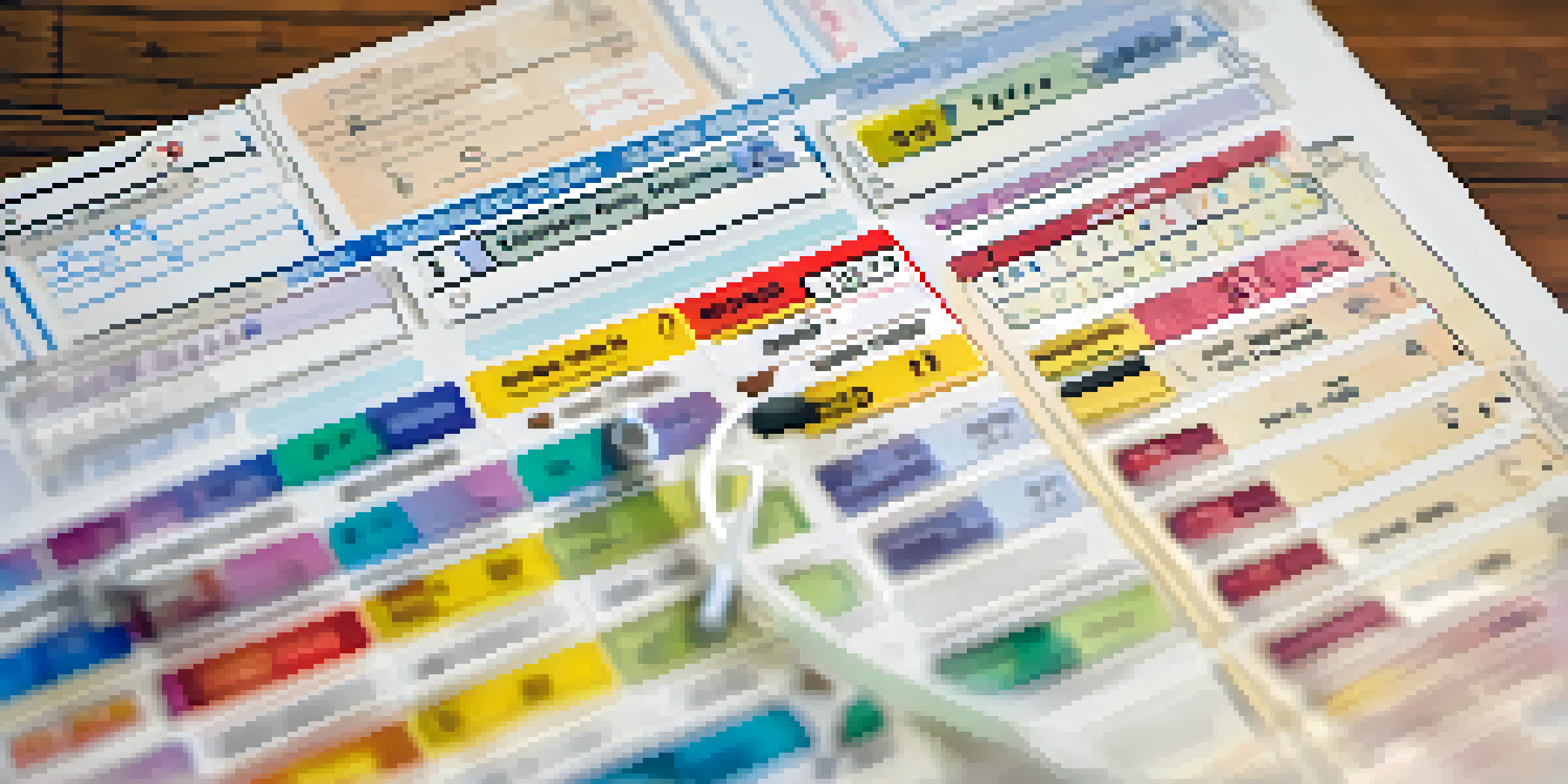Vaccinations for Adults: Why They're Important for Health

Understanding Adult Vaccinations and Their Purpose
Vaccinations are often thought of as something for children, but adults need them too. Vaccines protect against various diseases, some of which can be severe or even life-threatening. By understanding the purpose of adult vaccinations, we can appreciate their role in maintaining public health and personal well-being.
Vaccination is the most effective way to prevent infectious diseases and to protect not only ourselves but also those around us.
As we age, our immune systems can weaken, making us more susceptible to infections. Some vaccines, like the flu shot or the shingles vaccine, are specifically designed to bolster our defenses as we get older. Ensuring we stay up-to-date with vaccines can help us lead healthier, more active lives.
In addition to protecting ourselves, vaccinations help create herd immunity, reducing the spread of diseases in the community. This means that when more people are vaccinated, even those who cannot get vaccinated, like infants or people with certain health conditions, are better protected.
Common Vaccines Recommended for Adults
Several vaccines are essential for adults, including the flu shot, Tdap (tetanus, diphtheria, and pertussis), and the HPV vaccine. The flu shot is recommended annually, as the virus changes each year, and it can significantly reduce your risk of severe illness. Tdap is crucial for adults, especially those in contact with young children, to prevent the spread of whooping cough.

The HPV vaccine is vital for preventing certain types of cancer, and it's recommended for both men and women up to the age of 26. Additionally, adults aged 50 and older should consider getting the shingles vaccine to prevent this painful condition. Staying informed about these recommendations is key to your health.
Vaccinations Are Crucial for Adults
Adult vaccinations are vital for personal health and public safety, especially as immunity wanes with age.
Other vaccines, like the pneumococcal vaccine, should be discussed with your healthcare provider, especially if you have underlying health conditions. By being proactive about vaccinations, you are taking a significant step in safeguarding your health.
The Role of Vaccinations in Preventing Disease Outbreaks
Vaccinations play a crucial role in preventing outbreaks of diseases that can spread rapidly within communities. A great example is the measles outbreak that occurred in the past, where the majority of cases were among unvaccinated individuals. This underscores the importance of maintaining high vaccination rates to keep such diseases at bay.
The greatest weapon against the spread of disease is vaccination.
When vaccination rates drop, it opens the door for diseases to re-emerge, which can be particularly dangerous for vulnerable populations. Adults who are vaccinated not only protect themselves but also contribute to the overall health of their community. This interconnectedness highlights the social responsibility that comes with vaccination.
Moreover, vaccinations can save healthcare systems from becoming overwhelmed during outbreaks. By preventing widespread illness, we help ensure that medical facilities are available for those who need them most, creating a healthier environment for everyone.
Addressing Myths and Misconceptions About Vaccinations
Despite overwhelming evidence supporting the safety and effectiveness of vaccines, myths and misconceptions persist. Many people worry about the side effects of vaccinations, but it's important to understand that serious side effects are extremely rare. Most people experience only mild reactions, like soreness at the injection site.
Another common myth is that vaccines can cause the diseases they are meant to prevent. In reality, vaccines contain either inactivated or weakened parts of the virus or bacteria, which cannot cause illness. Educating ourselves and others about these misconceptions can help foster a more informed public.
Stay Informed About Vaccine Needs
Regular check-ups and updated vaccination records help ensure you receive necessary vaccines on time.
It's also crucial to consult trusted healthcare providers when seeking information about vaccines. They can provide reliable data and clear up any concerns, empowering individuals to make informed decisions about their health.
The Importance of Keeping Vaccination Records Updated
Keeping an updated vaccination record is vital for maintaining your health and ensuring you're protected against various diseases. An accurate record can help you and your healthcare provider track which vaccinations you need and when. It’s also helpful for travel, school enrollment, and certain job requirements.
You can request your vaccination history from your healthcare provider or local health department if you’re unsure about your status. If you’ve moved or changed doctors, it's essential to maintain your records so that you can stay up-to-date on your vaccinations without missing anything.
Some adults may also need to receive vaccines even if they were previously vaccinated, especially if their immunity has waned over time. By keeping your vaccination history organized, you empower yourself to safeguard your health effectively.
Vaccinations and Travel: What You Need to Know
Traveling can expose you to diseases not commonly found in your home country, making vaccinations essential for safe travel. Many destinations require proof of certain vaccinations, such as yellow fever or hepatitis A, to protect both travelers and local populations. Researching vaccination requirements before your trip is crucial.
It's also wise to consult a healthcare provider well in advance of your travels. They can recommend vaccines based on your travel itinerary, health history, and any activities you plan to engage in. This proactive approach can help you avoid illness and enjoy your trip to the fullest.
Myths About Vaccinations Persist
Despite evidence of their safety, misconceptions about vaccines can lead to hesitancy and reduced vaccination rates.
Additionally, keep in mind that some vaccines may need time to become effective. Scheduling your vaccinations at least a few weeks before you travel ensures that you are adequately protected and can reduce the risk of getting sick while abroad.
Taking Action: How to Stay on Top of Your Vaccinations
Staying informed about your vaccination needs is an ongoing process. Regular check-ups with your healthcare provider can help you keep track of which vaccines are necessary based on your age, health status, and lifestyle. They can also provide reminders for when you need booster shots.
Creating a personal health plan that includes vaccination schedules can help you stay organized. You might even consider using apps or calendars to remind yourself of upcoming appointments, ensuring that you never miss a chance to protect your health.

Lastly, don't hesitate to ask questions or express concerns during your healthcare visits. Engaging in open conversations about vaccinations can lead to better understanding and adherence to your health plan, ultimately benefiting your long-term health.